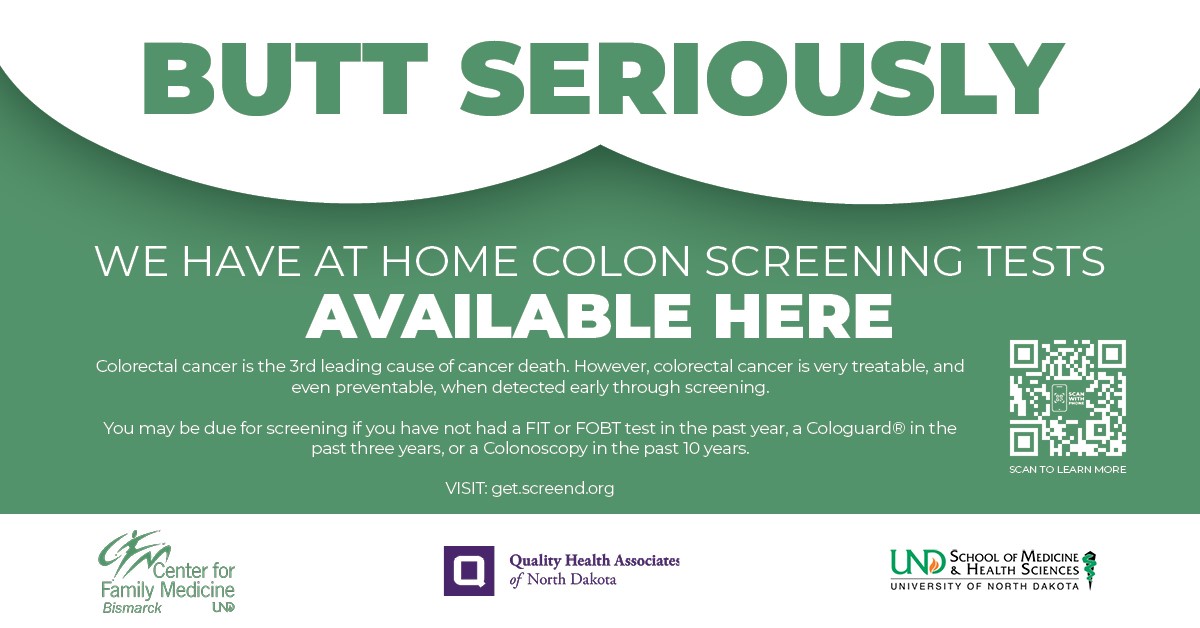Colorectal cancer is the 3rd leading cause of cancer death. However, colorectal cancer is very treatable, and even preventable, when detected early.
Get Screened.
Quality Health Associates of North Dakota and University of North Dakota Family Medicine has partnered with the goal of increasing colorectal cancer screening rates in Bismarck.
Join us in the efforts to prevent colorectal cancer in our community. Fill out the form to receive a call to initiate your screening and skip the doctor’s visit. If you qualify, you could have a home stool test sent to you without ever having to visit the doctor’s office.

Click the link above to find which screening option is right for you.
Once you complete the online form, and a nurse from the UND Center for Family Medicine will be in contact with you. They will review your medical history and will work with you to get the appropriate screening test ordered by our medical director.
All of the information entered is kept strictly confidential and is shared only with our participating medical providers for the purposes of screening for colorectal cancer. There is no guarantee of health insurance coverage. Your insurance policy may not cover all services provided by our medical facility. Please contact your insurance provider to verify your coverage and any out-of-pocket costs you may incur.
More questions? We will contact you to provide you with more information.
You should receive a call/email within 24 hours if submitted Monday-Friday. Watch your spam/junk folders for an email with subject “Get ScreenND Information Request”
Eager for more information? Call Cindy at UND Center for Family Medicine:
701-751-6765
Why should you get screened for colorectal cancer?
Most people should begin screening for colorectal cancer (cancer of the colon or rectum) at 45. There are many screening tests for colorectal cancer, including some you can do at home. The type of test is determined depending on your age, personal and family medical history, and preferences.
Here are some common options that may be right for you:
Colonoscopy
A colonoscopy allows a doctor to both examine the colon and rectum and remove polyps (growths that can turn into cancer) in the same procedure. During a colonoscopy, a doctor inserts a long, flexible, lighted tube with a camera called a colonoscope into the anus and slowly guides it through the rectum and colon. A camera on the scope transmits a video image from inside to a monitor, letting the doctor look for anything abnormal. If present, polyps are removed with the colonoscope. A colonoscopy should be done every 10 years for those at average risk.
Stool DNA
The stool DNA test is an at-home screening test for colorectal cancer. It tests for blood and DNA changes in the stool, which may indicate colorectal cancer. This test should be done every three years and can be completed at home. The stool sample is sent to a laboratory. There are no diet restrictions ahead of the test.
Fecal immunochemical test (FIT)
The fecal immunochemical test (FIT) is used to detect blood in stool that cannot be seen with the naked eye. A FIT is often used to detect bleeding in the digestive tract that has no other signs or symptoms. A FIT test may not detect blood from further up the digestive tract (such as the stomach), which means it is more specific to finding blood coming from the colon or rectum. This test should be done every year.


